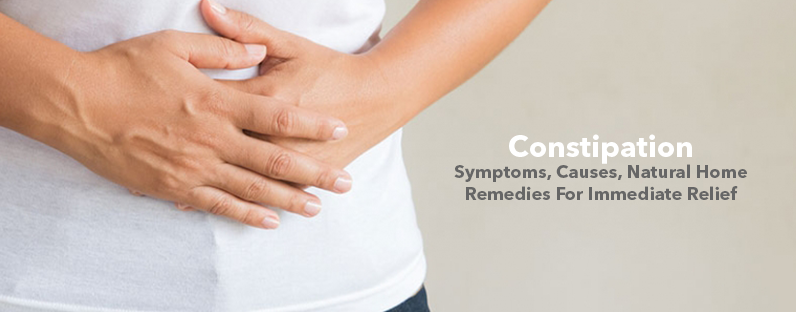Constipation- Symptoms, Causes and Natural Home Remedies for Immediate Relief
Chronic constipation is rare bowel movements or difficult passage that persists for several weeks or longer.
Constipation is usually described as having less than three movements in the intestine per week.
While sometimes constipation is very common, some people have chronic constipation that can interfere with their ability to perform their daily tasks. Chronic constipation may also reason to pressure on people to get a bowel movement.
Treatment for chronic constipation partially depends on the underlying cause. In some cases, however, a cause is never identified.
Symptoms of Constipation
The main symptoms of constipation are:
- Difficulty passing stool
- Straining when passing stool
- Passing less stool than usual
- Lumpy, dry, or hard stool
Other symptoms include:
- Pain and cramping in the abdomen
- Feeling bloated
- Nausea
- A loss of appetite
Causes
Your colon’s main job is to absorb water from residual food as it’s passing through your digestive system. It then creates stool (waste).
The muscles of the colon gradually propel the waste out to be expelled through the rectum. If stool remains in the colon too long, it can become hard and difficult to pass.
Poor diet frequently causes constipation. Dietary fiber and adequate water intake are necessary to help keep stools soft.
Fiber-rich foods are generally made from plants. Fiber comes in soluble and insoluble forms. The soluble fiber can dissolve in water and creates a soft, gel-like material as it passes through the digestive system.
Insoluble fiber maintains its structure as it passes through the digestive system. Both forms of fiber join with stool, increasing its weight and size while also softening it. This makes it easier to pass through the rectum.
Stress, changes in routine, and conditions that slow muscle contractions of the colon or delay your urge to go may also lead to constipation.
Common causes of constipation include:
- Dehydration
- A low fiber diet, especially diets high in meat, milk or cheese diets
- Lack of exercise
- Delaying the impulse to have a bowel movement
- Certain medicines, for example high calcium antacids and pain medicines
- Travel or other changes in routine
- Pregnancy
Underlying medical problems
The following are some underlying medical problems that can bring on constipation:
- Certain diseases, such as stroke, Parkinson’s disease, and diabetes
- Problems with the colon or rectum, including intestinal obstruction, irritable bowel syndrome (IBS), or diverticulosis
- Overuse or misuse of laxatives (medications to loosen stools)
- Hormonal problems, including an underactive thyroid gland
Risk factors
Factors which can increase your chronic constipation risk include:
- Being an older adult
- Being a woman
- Taking certain medicines, including sedatives, opioid pain medicines, certain antidepressants or blood pressure-reduction medicines
- Being dehydrated
- Eating a diet that’s low in fiber
- Have a mental health condition like as an eating disorder or depression
- Getting little or no physical activity
Complications
Constipation alone may be painful but it is not usually life-threatening.
However, it can become a problem if it is a symptom of a more serious underlying condition, such as colorectal cancer, or if it starts to cause further damage.
Damage that can arise as a result of severe constipation includes:
- Rectal bleeding after straining
- Anal fissure that is a small tear around anus
- Symptomatic hemorrhoids (piles), which are swollen, inflamed blood vessels in the anus
- Fecal impaction that occurs when dried stools stagnate and collect in the rectum and anus, potentially leading to mechanical obstruction
Many potential risks include reduced quality of life and increased depression.
Seeking medical advice for constipation may help prevent complications.
Natural and Home Remedies to Immediate Relieve
Don’t suppress urges to defecate. When the urge comes, find a toilet. Determine if there are drugs you are taking which could contribute to constipation with the help of your doctor and pharmacist. See if you can discontinue or alter the drugs.
Increase the fiber in your diet by consuming more fruits, vegetables, and whole grains. (There are other health benefits from this recommendation as well.) It can be difficult to get enough fiber in your diet to handle constipation effectively, so do not hesitate to take fiber supplements (wheat bran, psyllium, etc.) if appropriate. Use increasing amounts of fiber and/or change the type of fiber consumed until a satisfactory result has been achieved. Don’t expect fiber to work overnight. Allow a few weeks for adequate trials.
Prevention
To prevent it from becoming a chronic problem, use the same home-based methods you used to treat constipation:
- Eat a balanced diet with lots of fiber. Good sources of fiber are fruits, vegetables, legumes, and whole-grain breads and cereals. Fiber and water help the colon pass stool. Most of the fiber in fruits is found in the skins, such as in apples. Fruits with seeds you can eat, like strawberries, have the most fiber. Bran is a great source of fiber. Eat bran cereal or add bran cereal to other foods, like soup and yogurt. People with constipation should eat 18 to 30 grams of fiber daily.
- Drink 8 glasses of water per day. (Note: Milk can cause constipation in some people.) You may be dehydrated by liquids that contain caffeine, such as coffee and soft drinks. You may need to avoid consuming these items before you return to usual bowel habits.
- Exercise regularly
- When you feel urge push your bowels. Don’t wait
